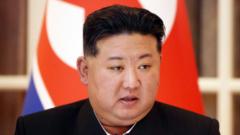This missile test occurred shortly after South Korea reported that its military fired warning shots at North Korean soldiers who had briefly crossed the highly fortified Demilitarized Zone (DMZ). Reports from Yonhap News Agency indicated that approximately 30 North Korean troops entered the southern side of the border, prompting accusations from Pyongyang regarding Seoul's actions being a "deliberate provocation."
The backdrop to these escalating tensions includes ongoing large-scale military exercises conducted by the United States and South Korea, which began earlier in the week. Upcoming diplomatic efforts may take shape as US President Donald Trump is scheduled to meet with South Korea's President Lee Jae Myung. Despite Lee's campaign focusing on improving inter-Korean relations, recent actions by North Korea—including Kim’s sister dismissing reconciliation overtures—cast doubt on such progress.
Kim Jong Un vocally condemned the joint military drills, labeling them as "most hostile and confrontational," while vowing to accelerate the development of North Korea's nuclear weapons program. This follows a troubling report from earlier this year, where North Korea announced the testing of an intermediate-range ballistic missile equipped with a hypersonic warhead, claiming its intent to deter adversaries in the Pacific region.
Concerns have also been raised regarding potential military cooperation between North Korea and Russia, with South Korean officials suggesting that Moscow has supplied missile technology and equipment to bolster Pyongyang's air defense capabilities in exchange for North Korean support in Ukraine. However, it remains unclear whether the newly tested missiles incorporated any Russian technology.
The Korean peninsula remains a point of contention, with North Korea maintaining one of the most oppressive regimes in the world. The division of the two Koreas since the end of the Korean War in 1953 still persists, leaving them technically at war, despite decades of relative calm on the surface.
The backdrop to these escalating tensions includes ongoing large-scale military exercises conducted by the United States and South Korea, which began earlier in the week. Upcoming diplomatic efforts may take shape as US President Donald Trump is scheduled to meet with South Korea's President Lee Jae Myung. Despite Lee's campaign focusing on improving inter-Korean relations, recent actions by North Korea—including Kim’s sister dismissing reconciliation overtures—cast doubt on such progress.
Kim Jong Un vocally condemned the joint military drills, labeling them as "most hostile and confrontational," while vowing to accelerate the development of North Korea's nuclear weapons program. This follows a troubling report from earlier this year, where North Korea announced the testing of an intermediate-range ballistic missile equipped with a hypersonic warhead, claiming its intent to deter adversaries in the Pacific region.
Concerns have also been raised regarding potential military cooperation between North Korea and Russia, with South Korean officials suggesting that Moscow has supplied missile technology and equipment to bolster Pyongyang's air defense capabilities in exchange for North Korean support in Ukraine. However, it remains unclear whether the newly tested missiles incorporated any Russian technology.
The Korean peninsula remains a point of contention, with North Korea maintaining one of the most oppressive regimes in the world. The division of the two Koreas since the end of the Korean War in 1953 still persists, leaving them technically at war, despite decades of relative calm on the surface.


















